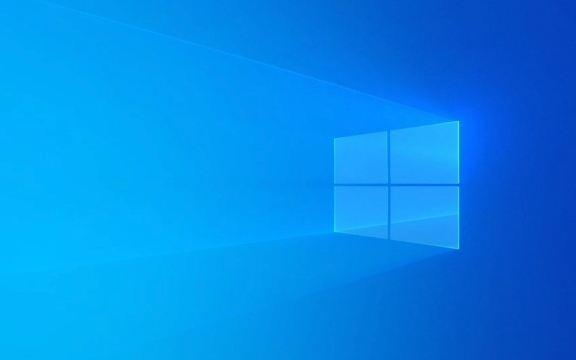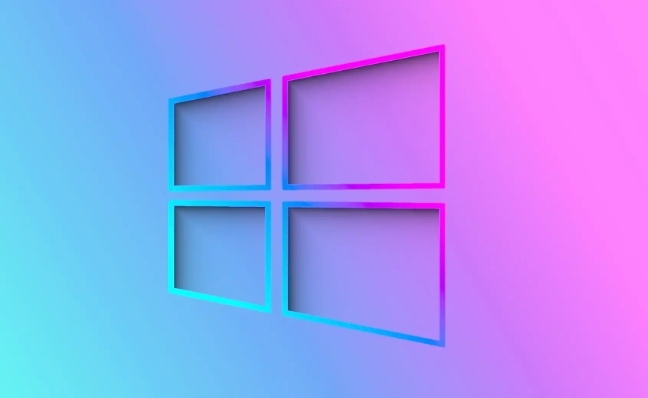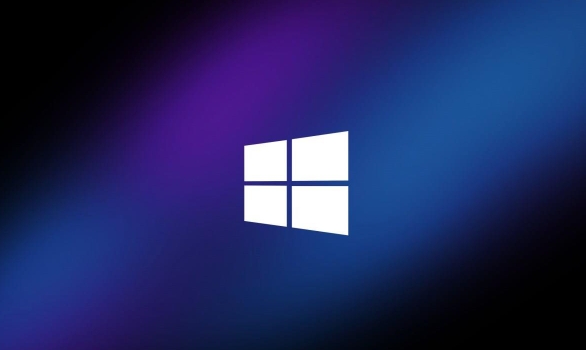Enable System Restore manually via sysdm.cpl, select the system drive, click Configure, choose Turn on system protection, and set max disk usage to 5–10%. 2. Create a manual restore point immediately by clicking Create in the System Protection tab and providing a description. 3. If System Restore won’t turn on, ensure the Volume Shadow Copy service is running and set to Automatic, temporarily disable third-party antivirus, and check Group Policy settings (or Registry on Home edition) to confirm System Restore isn’t disabled. 4. Use Command Prompt as Administrator to run wmic recoveryenvironment get recoveryenabled to check status, use PowerShell to enable restore with Enable-ComputerRestore -Drive "C:\", and create a point via wmic.exe /Namespace:\\root\default Path SystemRestore Call CreateRestorePoint "Manual Restore Point", 0, 100. 5. Run sfc /scannow to repair corrupted system files that may be blocking System Restore functionality, then retry enabling it, and verify operation by creating a test restore point to ensure it works properly.

If System Restore isn’t working or isn’t enabled in Windows 10, you’re not alone—this is a common issue that can leave your system vulnerable to problems after updates or software changes. The good news is that you can usually fix or enable System Restore with a few straightforward steps. Here’s how.

? 1. Enable System Restore Manually
System Restore is often disabled by default, especially on new installations or after major updates.
Steps:

- Press Windows R, type
sysdm.cpl, and press Enter. - Go to the System Protection tab.
- Under Protection Settings, select your system drive (usually C:).
- Click Configure.
- Select Turn on system protection.
- Adjust the Max Usage slider (recommended: 5–10%) to allocate disk space for restore points.
- Click Apply, then OK.
? Note: If the option is grayed out, you may need to run this as an administrator or check group policy settings (see below).
?? 2. Create a Restore Point Immediately
Once enabled, create a manual restore point to ensure it’s working.

Steps:
- In the same System Protection tab, click Create.
- Enter a description like “Baseline Restore Point”.
- Click Create, then wait for confirmation.
This gives you a fallback if something goes wrong later.
? 3. Fix Issues If System Restore Won’t Turn On
Sometimes, System Restore won’t enable due to policy restrictions or service problems.
A. Check the System Restore Service
- Press Windows R, type
services.msc, and press Enter. - Look for System Restore Service (also called File History Service or Volume Shadow Copy).
- Ensure Volume Shadow Copy is:
- Set to Automatic startup.
- Currently Running.
- If not, right-click it → Start, and set startup type to Automatic.
B. Disable Third-Party Antivirus Temporarily
Some aggressive antivirus programs block System Restore. Try disabling it briefly to see if that allows activation.
C. Check Group Policy (Pro/Enterprise editions)
- Press Windows R, type
gpedit.msc, and press Enter. - Navigate to:
Computer Configuration → Administrative Templates → System → System Restore - Make sure Turn off System Restore is set to Disabled.
- Also check Create restore points is enabled.
?? Home edition users:
gpedit.mscisn’t available by default. You’ll need to use Registry Editor or enable Group Policy manually.
? 4. Use Command Line to Repair or Enable (Advanced)
If GUI methods fail, use Command Prompt.
Steps:
Open Command Prompt as Administrator.
-
Run this command to check status:
wmic recoveryenvironment get recoveryenabled
(Should return
TRUEif enabled.) To enable System Restore via command:
powershell Enable-ComputerRestore -Drive "C:\"
To create a restore point:
wmic.exe /Namespace:\\root\default Path SystemRestore Call CreateRestorePoint "Manual Restore Point", 0, 100
? 5. Run System File Checker (SFC)
Corrupted system files can break System Restore.
- Open Command Prompt (Admin).
- Run:
sfc /scannow
- Wait for completion. If issues are found and fixed, restart and try enabling System Restore again.
Final Notes
- System Restore only works if previous versions of files are available and shadow copies aren’t corrupted.
- It’s not a replacement for backups—use File History or an external backup tool too.
- Some Windows updates or disk errors can disable restore points automatically.
Basically, enabling or fixing System Restore comes down to turning it on in System Properties, ensuring the service runs, and removing policy or software blocks. Once set up, it runs quietly in the background—just make sure to verify it’s working by creating a test restore point.
The above is the detailed content of How to enable or fix System Restore in Windows 10. For more information, please follow other related articles on the PHP Chinese website!

Hot AI Tools

Undress AI Tool
Undress images for free

Undresser.AI Undress
AI-powered app for creating realistic nude photos

AI Clothes Remover
Online AI tool for removing clothes from photos.

Clothoff.io
AI clothes remover

Video Face Swap
Swap faces in any video effortlessly with our completely free AI face swap tool!

Hot Article

Hot Tools

Notepad++7.3.1
Easy-to-use and free code editor

SublimeText3 Chinese version
Chinese version, very easy to use

Zend Studio 13.0.1
Powerful PHP integrated development environment

Dreamweaver CS6
Visual web development tools

SublimeText3 Mac version
God-level code editing software (SublimeText3)
 How to Change Font Color on Desktop Icons (Windows 11)
Jul 07, 2025 pm 12:07 PM
How to Change Font Color on Desktop Icons (Windows 11)
Jul 07, 2025 pm 12:07 PM
If you're having trouble reading your desktop icons' text or simply want to personalize your desktop look, you may be looking for a way to change the font color on desktop icons in Windows 11. Unfortunately, Windows 11 doesn't offer an easy built-in
 Fixed Windows 11 Google Chrome not opening
Jul 08, 2025 pm 02:36 PM
Fixed Windows 11 Google Chrome not opening
Jul 08, 2025 pm 02:36 PM
Fixed Windows 11 Google Chrome not opening Google Chrome is the most popular browser right now, but even it sometimes requires help to open on Windows. Then follow the on-screen instructions to complete the process. After completing the above steps, launch Google Chrome again to see if it works properly now. 5. Delete Chrome User Profile If you are still having problems, it may be time to delete Chrome User Profile. This will delete all your personal information, so be sure to back up all relevant data. Typically, you delete the Chrome user profile through the browser itself. But given that you can't open it, here's another way: Turn on Windo
 How to fix second monitor not detected in Windows?
Jul 12, 2025 am 02:27 AM
How to fix second monitor not detected in Windows?
Jul 12, 2025 am 02:27 AM
When Windows cannot detect a second monitor, first check whether the physical connection is normal, including power supply, cable plug-in and interface compatibility, and try to replace the cable or adapter; secondly, update or reinstall the graphics card driver through the Device Manager, and roll back the driver version if necessary; then manually click "Detection" in the display settings to identify the monitor to confirm whether it is correctly identified by the system; finally check whether the monitor input source is switched to the corresponding interface, and confirm whether the graphics card output port connected to the cable is correct. Following the above steps to check in turn, most dual-screen recognition problems can usually be solved.
 Want to Build an Everyday Work Desktop? Get a Mini PC Instead
Jul 08, 2025 am 06:03 AM
Want to Build an Everyday Work Desktop? Get a Mini PC Instead
Jul 08, 2025 am 06:03 AM
Mini PCs have undergone
 Fixed the failure to upload files in Windows Google Chrome
Jul 08, 2025 pm 02:33 PM
Fixed the failure to upload files in Windows Google Chrome
Jul 08, 2025 pm 02:33 PM
Have problems uploading files in Google Chrome? This may be annoying, right? Whether you are attaching documents to emails, sharing images on social media, or submitting important files for work or school, a smooth file upload process is crucial. So, it can be frustrating if your file uploads continue to fail in Chrome on Windows PC. If you're not ready to give up your favorite browser, here are some tips for fixes that can't upload files on Windows Google Chrome 1. Start with Universal Repair Before we learn about any advanced troubleshooting tips, it's best to try some of the basic solutions mentioned below. Troubleshooting Internet connection issues: Internet connection
 How to clear the print queue in Windows?
Jul 11, 2025 am 02:19 AM
How to clear the print queue in Windows?
Jul 11, 2025 am 02:19 AM
When encountering the problem of printing task stuck, clearing the print queue and restarting the PrintSpooler service is an effective solution. First, open the "Device and Printer" interface to find the corresponding printer, right-click the task and select "Cancel" to clear a single task, or click "Cancel all documents" to clear the queue at one time; if the queue is inaccessible, press Win R to enter services.msc to open the service list, find "PrintSpooler" and stop it before starting the service. If necessary, you can manually delete the residual files under the C:\Windows\System32\spool\PRINTERS path to completely solve the problem.
 How to run Command Prompt as an administrator in Windows 10?
Jul 05, 2025 am 02:31 AM
How to run Command Prompt as an administrator in Windows 10?
Jul 05, 2025 am 02:31 AM
To run command prompts as administrator, the most direct way is to search through the Start menu and right-click "Run as administrator"; secondly, use the Win X shortcut menu to select "Command Prompt (Administrator)" or "Windows Terminal (Administrator)"; you can also open the run window through Win R and enter cmd and press Ctrl Shift Enter to force running as administrator; in addition, you can set shortcut properties to achieve automatic running as administrator. All the above methods require administrator permission and confirmation through UAC. Pay attention to security risks during operation.







